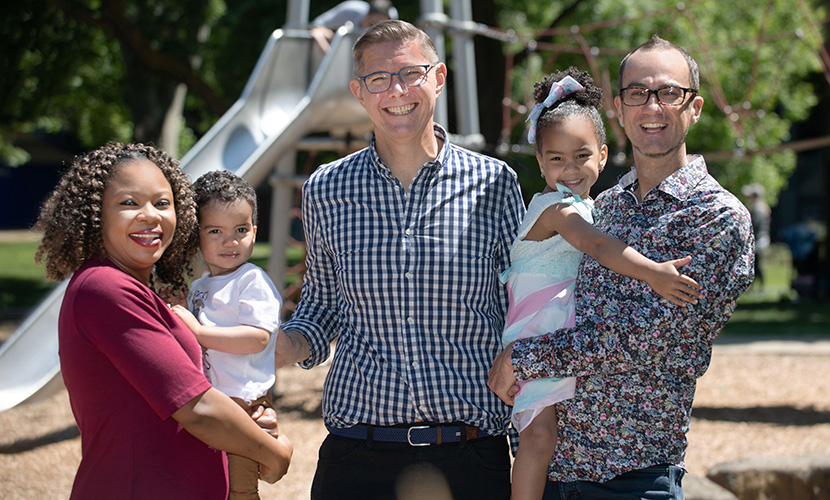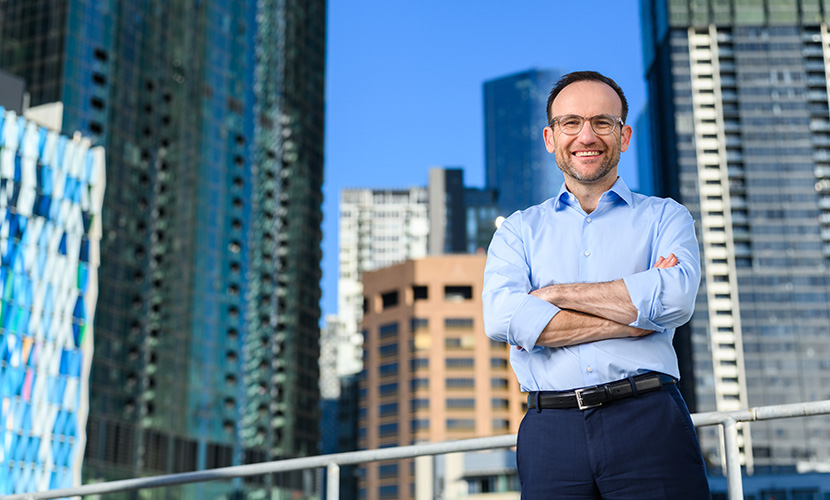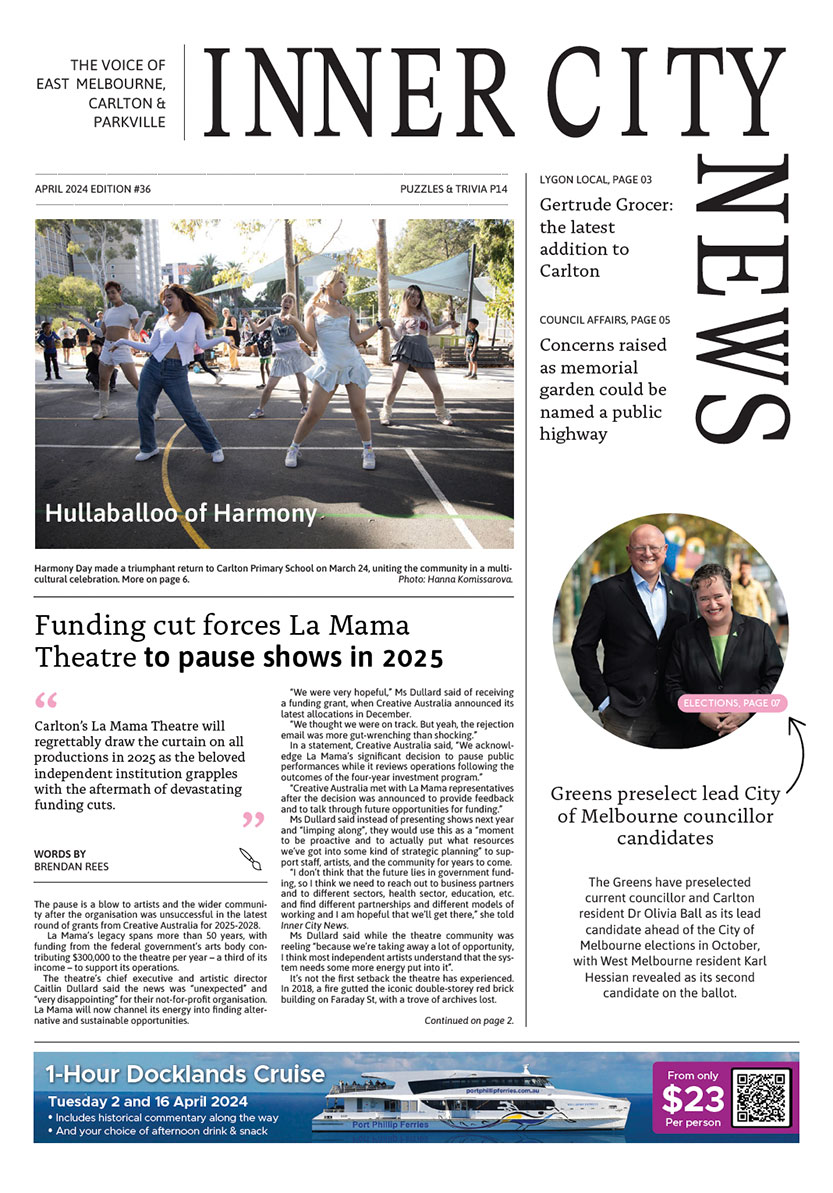Greens tipped to win Melbourne again as Labor look to address decade slide
Ahead of the federal election on May 21, Inner City News looks at the seat of Melbourne and spoke with both Greens leader (and incumbent) Adam Bandt, and Labor candidate Keir Paterson.
Greens leader Adam Bandt goes into the 2022 Federal Election as red-hot favourite to win the seat of Melbourne for a fifth-straight time.
The division of Melbourne, which covers the CBD and immediate suburbs north of the Yarra River to both the east and west, has been dominated by the Greens since 2010 and remains their only lower house seat in Canberra.
Held by Labor from 1904 to 2010, the party has since suffered a huge loss in first-preference votes since Bandt’s breakthrough victory 12 years ago.
That year, the percentage of first-preference Labor votes dropped from 49.5 (in 2007) to 38.1.
It has continued to slide since, to a record low 19.7 per cent in the last election in 2019.
The candidate tasked with halting this slide and deliver what would be a huge underdog victory for Labor is Kensington resident Keir Paterson.
After winning preselection in August 2021, Mr Paterson has been campaigning since September and said voters had one thing on their mind.
“There’s a real mood for change,” he told Inner City News.
“The number of people that we speak to that say ‘we just need to get rid of this government’ — that is the number one, two and three priority for most of the people I speak to in the electorate.”
Born in Carlton and having owned his first home in North Melbourne, Mr Paterson said he had “lived on and off in the electorate my whole life.”
And despite having also lived in three different continents, he counts Melbourne as “by far the best city in the world to live in.”
He has worked in the mental health space and, most recently, was president of the 50,000-member Bicycle Network, which advocates for more sustainable transport and safer riding.
Mr Paterson said looking at Labor’s recent election results “doesn’t give you the full picture”, referencing the fact Labor’s previous candidate for the seat of Melbourne, Luke Creasey, withdrew before the 2019 count due to offensive social media posts that came to light.
However, Labor’s primary vote had already dipped well before 2019, something he was determined to turn around.
“I don’t have a theory as to why,” he said.
I can say that this campaign that we’re running at the moment is probably the most active and, certainly in my view and the view of other observers, the most organised and proactive campaign [in recent elections]. We’ve got a really good volunteer base and a lot of supporters out there, and we’re running a really positive campaign.
Labor and Mr Paterson are under no illusion as to the magnitude of their upcoming task but remained positive about their prospects.
“We’re very confident about this election. There’s no question it’s a pretty steep hill to climb,” he said.
“I feel positive about it, the vibe is good. There’s no question that Adam is a strong incumbent, and this seat is a big focus for the Greens, they’ve got a huge budget and he’s spending a lot of money in the electorate … I’m really motivated to change this government, and we need a Labor majority to change the government. But also, I’ve become increasingly frustrated by the lack of action of issues like climate change, inequality, job security, aged care, childcare et cetera. And unfortunately, having a member of parliament from a minor party doesn’t get us traction on those issues.”
But Mr Bandt rejected this when speaking with Inner City News and said the growing prospect of a hung parliament — whereby no party has enough seats to secure an overall majority — means those in Melbourne could have a significant say.
“We’re heading towards a really tight election and people of Melbourne again have the chance to have a really powerful seat at the table, in a very finely balanced parliament. My priorities in that position will be to kick the Liberals out, and then push the next government to act on the climate crisis, but also to get dental and mental health [services] into Medicare, build affordable housing and wipe the student debt. They’re things that will make a big difference to people’s lives,” he said.
The Greens leader has focused his campaign broadly on climate action, the cost of living and the need for a federal integrity body.
Locally, Mr Bandt said the housing crisis had been the “single biggest change” in the electorate since he was elected in 2010.
“The things that are good about Melbourne are still there, but they’re under threat. A big priority for me is keeping Melbourne liveable, and that means ensuring that everyone can afford to live [here] … although there might be a pause in rent [rises] in some areas at the moment, on the whole rent and housing prices have skyrocketed, and it’s putting a lot of pressure on people who live in Melbourne. It’s making it more difficult for people who want to live near where they work or study and we need some new thinking to tackle the housing affordability crisis, because at the moment it’s getting out of control.”
Mr Bandt said he did not believe the state or federal government had grasped the permanent changes COVID-19 had forced upon Melbourne, in particular what the change in work practices meant for the local community.
If elected, the Greens will push for rent reductions to innovative and creative businesses that come into the area and sign long-term leases.
He said that while the pandemic had been particularly tough for small businesses owners, particularly in the CBD and Docklands, the flow-on affects had impacted residents too.
“Speaking to inner-city residents, one clear message that comes through is that a lot of the small businesses and services that they’ve relied on have gone, and they may not come back … we’ve got to work out how to rebuild in a way that isn’t just about supporting one big event here and another big event there — we need a more sustainable way that works at a human-scale that supports residents and businesses in the area.”
Both Labor and the Greens were united in the push for a national independent commission against corruption (ICAC). Mr Bandt, who introduced the first-ever bill for a federal ICAC in the House of Representatives said, “it can’t come soon enough”, while Mr Paterson said the issue was “spontaneously identified” by about one in three people as their number one issue heading into the May 21 poll.
“The thing that’s surprised me the most this election — you expect a lot of the prominent issues, you can anticipate those — but the Federal ICAC, and in general restoring integrity and trust to federal politics just comes through as a really high priority for people. They actually nominate that as one of their most important issues, which surprised us,” he said.
“I think people are really sick of our federal politics, they’re sick of the perception of the lack of accountability and the perception of favouritism and corruption and they want to do something about.”
Other candidates contesting the seat of Melbourne in this election include Justin Borg (United Australia Party), James Damches (Liberal), Richard Peppard (Liberal Democrat Party), Scott Robson (Independent), Walter Stragan (One Nation), Bruce Poon (Animal Justice Party) and Colleen Bolger (Victorian Socialists) •

Carlton language school championed by Ukrainian refugee





 Download the Latest Edition
Download the Latest Edition